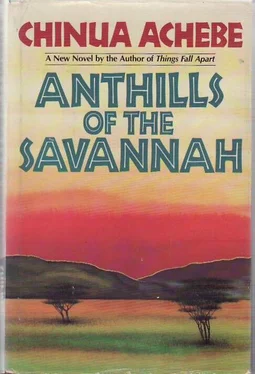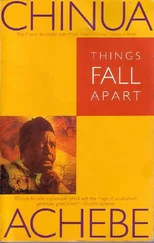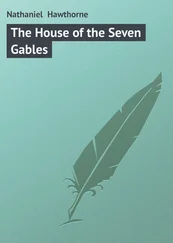Chinua Achebe - Anthills of the Savannah
Здесь есть возможность читать онлайн «Chinua Achebe - Anthills of the Savannah» весь текст электронной книги совершенно бесплатно (целиком полную версию без сокращений). В некоторых случаях можно слушать аудио, скачать через торрент в формате fb2 и присутствует краткое содержание. Жанр: Проза, на английском языке. Описание произведения, (предисловие) а так же отзывы посетителей доступны на портале библиотеки ЛибКат.
- Название:Anthills of the Savannah
- Автор:
- Жанр:
- Год:неизвестен
- ISBN:нет данных
- Рейтинг книги:4 / 5. Голосов: 1
-
Избранное:Добавить в избранное
- Отзывы:
-
Ваша оценка:
- 80
- 1
- 2
- 3
- 4
- 5
Anthills of the Savannah: краткое содержание, описание и аннотация
Предлагаем к чтению аннотацию, описание, краткое содержание или предисловие (зависит от того, что написал сам автор книги «Anthills of the Savannah»). Если вы не нашли необходимую информацию о книге — напишите в комментариях, мы постараемся отыскать её.
Anthills of the Savannah — читать онлайн бесплатно полную книгу (весь текст) целиком
Ниже представлен текст книги, разбитый по страницам. Система сохранения места последней прочитанной страницы, позволяет с удобством читать онлайн бесплатно книгу «Anthills of the Savannah», без необходимости каждый раз заново искать на чём Вы остановились. Поставьте закладку, и сможете в любой момент перейти на страницу, на которой закончили чтение.
Интервал:
Закладка:
At this point he is boldly interrupted by the Commissioner for Justice and Attorney-General and then by everybody else with an assortment of protests. Actually it is His Excellency's well-chosen words that signalled the brave interruption, for despite the vigour in his voice the words themselves had sounded the All Clear and told us it was all right now to commence our protestations. So we began to crawl out into the open again. In his precise manner the Attorney-General says: 'Your Excellency, let us not flaunt the wishes of the people.'
'Flout, you mean,' I said.
'The people?' asked His Excellency, ignoring my piece of pedantry.
'Yes, Your Excellency,' replied the Attorney-General boldly. 'The people have spoken. Their desire is manifest. You are condemned to serve them for life.' Loud applause and shouts of 'Hear! Hear!' Many voices in contest for the floor.
'I am no lawyer,' says His Excellency, his slightly raised tone breaking up a hand to hand tussle among the voices, 'only a simple soldier. But a soldier must keep his word.'
'But you, I beg pardon, I mean Your Excellency, cannot break a word you never even said. The nonsense about one hundred per cent was only the machination of a newspaper editor who in my judgement is a self-seeking saboteur.'
'No obligation, Your Excellency, to keep faith with heretics,' boomed the Reverend Professor Okong's voice.
'On point of order, Your Excellency.' He glares at me now, and then nods to the Attorney-General, who had been interrupted by Okong and myself, to continue.
'Your Excellency, three provinces out of four is a majority anywhere.' More applause.
'Your Excellency I wish to dissociate myself from the Attorney-General's reference to a saboteur and to appeal to my colleagues not to make such statements against public servants who are not present to defend themselves.' I liked the look of terror on my colleagues' faces when I used the word dissociate and the relaxation that followed when they realized that I was not saying what they feared I was saying. Even His Excellency was thrown off his poise momentarily. But, unlike the rest, knowing that he has been teased does not amuse him or offer him relief; rather it fills him with anger. He swings his head sharply to his right where the Chief Secretary sits on the edge of his chair.
'Any other business?' The way he says it this time it no longer is an idle formula. It had the ring of a rebuke: something like How many times do you want me to ask this question?
This unexpected convergence of the crisis on his person threw the Chief Secretary into utter confusion and inelegance of speech.
'Oh no sir. Nothing at all, sir. Your Excellency.' And then he looks across the table and our eyes meet. I don't like to take credit for this kind of thing but I think that the derisive smile on my face at that moment may have turned the bureaucrat right about. Perhaps he saw in my face a foreshadowing of peer taunts and ridicule lying in ambush for him beyond the massive doors of this citadel. He is very sensitive about accusations of boot-licking especially when they come from me because I think he has a lot of respect for me. And in a way I don't dislike him, either. He is after all, unlike the rest of us, a career civil servant who would have served a civilian president… or indeed the British raj… as well as he now serves His present Excellency. But whatever it was that did it he now shows totally untypical spirit that for him almost borders on recklessness. He picks up his fallen words again: 'But Your Excellency, if I may — erm — crave your indulgence — erm — Your Excellency's indulgence — and — erm — put in a word for the Honourable Commissioner.'
'Which Honourable Commissioner? There are twelve of them, you know.' This would have excited laughter at other times, but something totally new is happening now and we are all too amazed.
'Your Excellency I mean the Honourable Commissioner for Information.' There is a long and baffled silence. Then His Excellency who, I should admit, is extremely good at such times says:
'He doesn't need a word from you. Remember, he owns all the words in this country — newspapers, radio and television stations…'
The peals of laughter that broke out engulfed everybody for minutes and put us all at ease again. Colleagues close enough were laughing and slapping my back. Others beamed their goodwill across.
'The Honourable Commissioner for Words,' the Attorney-General manages through his laughter. 'That's a good one. By God that's a good one.' He is dabbing his eyes with a handkerchief still neatly folded.
'Opposed! It sounds too much like me,' protested the Commissioner for Works.
'That's true,' says the Attorney-General, pausing in his laughter to reflect. 'Commissioner for Words and Commissioner for Works. There's a point there.'
'Theologically speaking there is a fundamental distinction.' This is Professor Okong in his deep pulpit voice.
'Ah, Professor done come-o,' says the Commissioner for Education. We were all so merry. If the meeting ended now we would go home happy — the homely ones among us entitled to answer their wives with a smile should they ask what kind of day they'd had. But His Excellency wasn't done with us yet, alas!
'What were you going to say for the Commissioner of Information, anyway?'
'Your Excellency, it is — erm — about this visit to Abazon.'
'In that case the meeting stands adjourned.' He gets up abruptly. So abruptly that the noise we make scrambling to our feet would have befitted a knee-sore congregation rising rowdily from the prayers of a garrulous priest.
His Excellency sits down again and leans back calmly on his swivel chair in order to search under the table for the court shoes he always kicks off at the beginning of our meetings and which the Chief Secretary as always and quite unobtrusively arranges side by side with movements of his own feet to save His Excellency the trouble of prolonged searching at the end of the meeting. If His Excellency is aware of this little service he never acknowledges it, but takes it for granted like the attention of the invisible bell-boy who shines your shoes overnight in an expensive hotel. With consummate deliberation he looks down to the floor and slips in his right foot. He looks on the other side and slips in his left. And then discarding altogether the sprightliness of his first rising he now heaves himself slowly up by the leverage of his hands on the heavy arms of his chair. And the amazing thing is that this lumbering slowness and the former alacrity seem equally to become him.
We all stand stock-still. The only noise in the room comes from his own movements and the continuous whirring of the air-conditioners which have risen to attention in the silence of a deferential Cabinet waiting with bated breath on the Chief to become shod again and, in his good time, withdraw into the seclusion of his adjoining private enclosure.
Sometimes he would say Good afternoon, gentlemen on taking leave of us. Today, naturally, he said nothing. As he left his seat an orderly gathered up his papers quickly and followed him out. Another orderly, more stern-faced, opened the heavy doors of carved panels, stood aside and gave a long, hand-quivering salute.
'He is not in a good mood today,' says the Chief Secretary, breaking the freeze. 'We'll bring it up again next Thursday, Chris. Don't worry.'
His Excellency is probably meant to overhear this and I believe he does. I could see a smile or the radiance of a smile from the back of his head like the faint memory of light at the edges of an eclipse.
In the final stages of His Excellency's retiring, the silence in the Council Chamber seemed to be undergoing a subtle change. Something indeterminate had entered it and was building up slowly within its ambience. At first I thought the air-conditioners had become just fractionally louder which would be perfectly consistent with the generating vagaries of the National Electric Power Authority. Then the Chief Secretary's observation and the flurry of conversation it started about His Excellency's changing moods kept us from noticing the sound for a while. The Attorney-General came over to my seat and clapped me on the shoulder.
Читать дальшеИнтервал:
Закладка:
Похожие книги на «Anthills of the Savannah»
Представляем Вашему вниманию похожие книги на «Anthills of the Savannah» списком для выбора. Мы отобрали схожую по названию и смыслу литературу в надежде предоставить читателям больше вариантов отыскать новые, интересные, ещё непрочитанные произведения.
Обсуждение, отзывы о книге «Anthills of the Savannah» и просто собственные мнения читателей. Оставьте ваши комментарии, напишите, что Вы думаете о произведении, его смысле или главных героях. Укажите что конкретно понравилось, а что нет, и почему Вы так считаете.











